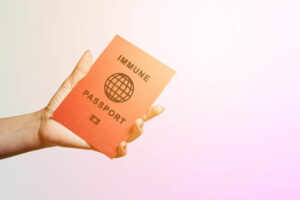In response to Ada Lovelace Institute’s call for public evidence regarding the vaccine passports and COVID status apps, Dr Btihaj Ajana, Reader in Media and Digital Culture at the Department of Digital Humanities, recently submitted some critical reflections on the ethical implications of these technologies and proposals.

Here is a summary of submission:
Discrimination and inequality
I believe that the deployment of Covid-19 vaccine passports and status apps for governing movement and access to certain spaces and services will inevitably create new forms of discrimination while exacerbating exiting ones. First of all, it should be borne in mind that, for the time being, not all countries in the world have equal access to the new Covid-19 vaccines nor the equal economic capacity to acquire the needed doses to immunise the whole population. For instance, many low-income countries will be relying on COVAX which can only achieve 20% vaccination coverage (see www.gavi.org). This, as scientific studies indicate, is not enough for achieving herd immunity through vaccination. As a result, people from such countries are likely to have their freedom of travel severely restricted as a result of the potential imposition of vaccine passports worldwide.
Also, such developments need to be regarded as part of the historical and social contexts (not just in terms of the current Covid-19 situation). We are already living in a “world apartheid” whereby the amalgamation of borders, passports, and biometric technologies has been instrumental in creating a dual regime of circulation and an international class differentiation through which some nations can move around and access services with ease while others are excluded and made to endure an “excess of documentation and securitisation” (because of their nationality, socio-economic standing, etc. and soon likely, because of their vaccine status). Introducing Covid-19 vaccine passports and status apps as “tokens of freedom” will add yet another layer of inequality and discrimination, the consequences of which are likely to outlive the pandemic itself.
Digital divide and technological determinism
The proposal for introducing vaccine status apps assumes that everyone has or wants a smartphone. There is a high level of technological determinism currently dominating the debates on these issues and which seems to ignore that the digital divide still exists in the world. Making freedom of travel and right to access services and spaces contingent on having a digital vaccination passport and a status app is inherently exclusionary. Already the deployment of contact tracing apps has revealed the flaws of such technologies. In Spain for instance, Radar Covid, the official contact tracing app, is not operational on older iPhone models. Travellers to Spain must download and use the app, but if their smartphone is an older model, then they cannot use the app. Similarly, and as stated on NHS website, the Covid-19 app does not work on all phones: “Older models of Apple (iPhone 5S and iPhone 6/6Plus or earlier) and Android phones that do not support iOS 13.5 or Android 6.0 (Marshmallow) and higher will not be able to use the app. Windows phones and new models of Huawei smartphones launched from May 2019 will also not be able to use the app. This is because your phone needs access to the Apple App Store, or Google Play Services, to be able to download the NHS COVID-19 app.”
As such, technological affordances also play a role in shaping the use, access and experience of Covid-19 related apps, and can thereby lead to forms of exclusion. Furthermore, the imposition of digital vaccine passports and status apps also seems to ignore that some people do not wish to have their everyday activities completely dependent on a digital app or a certificate. The right to be disconnected from the digital world and its big data machine, as hard as it is in today’s world, should still be respected and protected.
Function creep
The issue of function creep refers to when a certain technology gets repurposed and used for something other than its intended use. We have seen time and again throughout the recent decades how practices and mechanisms that are initially designed for specific exceptional circumstances end up becoming routine and widespread across the entire fabric of society. One example is to do with the application of biometric technology. The initial social and political use of biometrics was limited to exceptional spaces and extreme cases, such as detention centres and crime investigations. Over the years, biometrics became more widely used so much so that it is now embedded in everyday products and services. We use biometric fingerprints and facial recognition to unlock our phones or log into our bank accounts; we use MobilePay to purchase our morning coffee; voice recognition to interact with virtual assistants such as Amazon’s Alexa and Google Assistant, and so on. Technologies that would have seemed intrusive a few years ago are so commonplace today. And with the current technologies being developed to manage people’s health status through biometric apps, we are likely to see a similar function creep and repurposing that may well outlive the pandemic itself, raising questions about privacy, human rights and data protection.
A false sense of protection
Scientific evidence concerning the efficacy of new covid-19 vaccines in terms of preventing infection and transmission is still hazy. As Hodgson et al. argue, assessment of the efficacy of Covid-19 vaccine is particularly complex given that the fundamental understanding of the pathogen is still evolving. There is an urgent need for critical and scientifically rigorous appraisals of the efficacy outcomes of these newly developed Covid-19 vaccines before rushing to implement vaccine passports and status apps. Otherwise, there is a risk that the implementation of these mechanisms might end up giving a false sense of safety and protection while there is not yet a conclusive evidence that someone who is vaccinated cannot pass on the virus to others.
Overall, I believe that the implementation of Covid-19 vaccine passports and status apps carries several risks with potentially harmful consequences for individuals and societies.
Btihaj Ajana, February 2021
